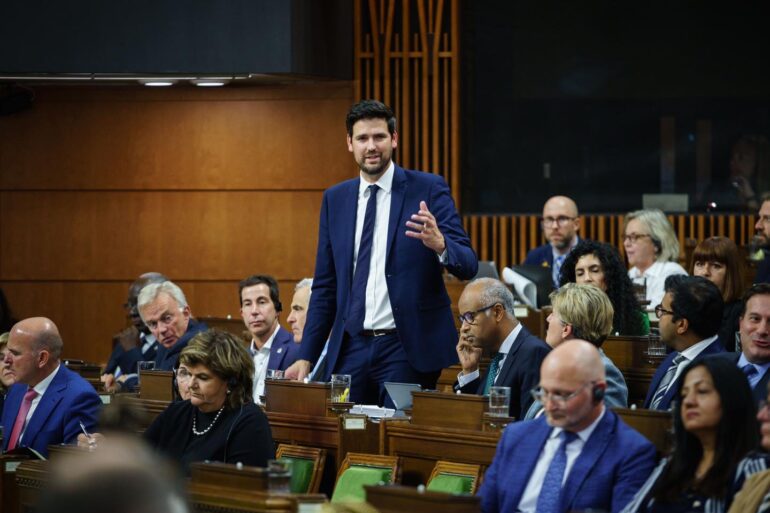TL;DR:
- Immigration Minister Sean Fraser highlights the positive impact of advanced analytics on processing times.
- Artificial intelligence (AI) does not make final decisions on immigration applications; human involvement is crucial.
- The new system expedites temporary resident visa (TRV) applications for family reunification.
- Advanced analytics identify candidates with pending permanent residency applications, fast-tracking their temporary visas.
- Approval rates under the new system exceed 98 percent.
- Spouses and dependent children with temporary visas receive open work permits for immediate employment.
- Concerns about potential biases in machine-based decision-making are raised.
- Liberal MP Hedy Fry adds a light-hearted moment by playfully referring to Fraser as “Mr. Sexy.”
Main AI News:
In a press conference held on Friday, Immigration, Citizenship, and Refugees Minister Sean Fraser hailed the transformative impact of new technologies on processing times within his department. While acknowledging the significant gains in productivity achieved through advanced analytics, Fraser emphasized that final decisions on immigration applications are not made by artificial intelligence (AI) systems. He reassured the public that human involvement remains a critical component of Immigration, Refugees and Citizenship Canada (IRCC), dispelling any concerns about automated determinations.
The exact nature of the technology utilized was not disclosed by Fraser. Instead, he underscored the continued role of human officers at IRCC, stressing their responsibility to safeguard the process’s integrity. Fraser’s announcement centered on the adoption of the new system for temporary resident visa (TRV) applicants seeking to reunite with family members in Canada.
Previously, family members awaiting approval for permanent residency in Canada could apply for a temporary visitor’s visa to join their sponsor. However, the likelihood of visa denials due to concerns over applicants overstaying their visas posed a significant hurdle. Addressing this challenge, the new system employs advanced analytics to expedite the approval process for individuals with pending permanent residency applications. Fraser expressed his optimism that the turnaround time could now be as short as 30 days, allowing family members to reunite with their loved ones more expeditiously.
By thoroughly evaluating each applicant’s file, the advanced analytics system assesses their probability of securing permanent residency. Those deemed highly likely to receive permanent residency are placed in a category that fast-tracks their temporary visa. Fraser revealed that the approval rate under the new system had surpassed 98 percent, indicating its effectiveness in facilitating efficient processing.
In a further development, Fraser disclosed that spouses and dependent children holding temporary visas will now receive open work permits, regardless of whether they apply before or after their arrival in Canada. This policy change eliminates the waiting period for spouses to start working upon their arrival, recognizing the critical need for self-sufficiency and supporting their families from the outset.
While the minister’s announcement received praise from Vancouver-based immigration lawyer Will Tao, Conservative immigration critic Tom Kmiec expressed reservations. Kmiec argued that the measures failed to address the issue of prolonged processing times, which, contrary to the minister’s claims, are reportedly increasing. Kmiec called for greater accountability and results commensurate with the substantial investment in staffing and funding for the department since 2015.
The implementation of advanced analytics in immigration processing has raised concerns about the potential biases in machine-based decision-making. Tao urged further scrutiny, highlighting the importance of ensuring fair treatment for all families, irrespective of their origin or other distinguishing characteristics. He emphasized the need to address any existing discrepancies in immigration procedures.
Notably, Liberal MP Hedy Fry added a moment of levity to the event by playfully introducing Fraser as “Mr. Sexy.” Although Fry commended Fraser’s appearance and referenced his alleged recognition as the “sexiest man on [Parliament] Hill,” the source of this accolade was not specified. Fraser, sporting a lighthearted reaction, greeted Fry with a chuckle and a hug but refrained from acknowledging her comments during his subsequent address.
Conlcusion:
The integration of advanced analytics and human oversight in immigration processing represents a significant advancement. The use of technology to expedite visa approvals and provide open work permits demonstrates a commitment to efficiency and support for families. However, concerns regarding biases in machine-based decision-making require ongoing attention and investigation. Overall, these developments signal a positive shift in the market, with increased productivity and the potential for smoother transitions for applicants and their families.

